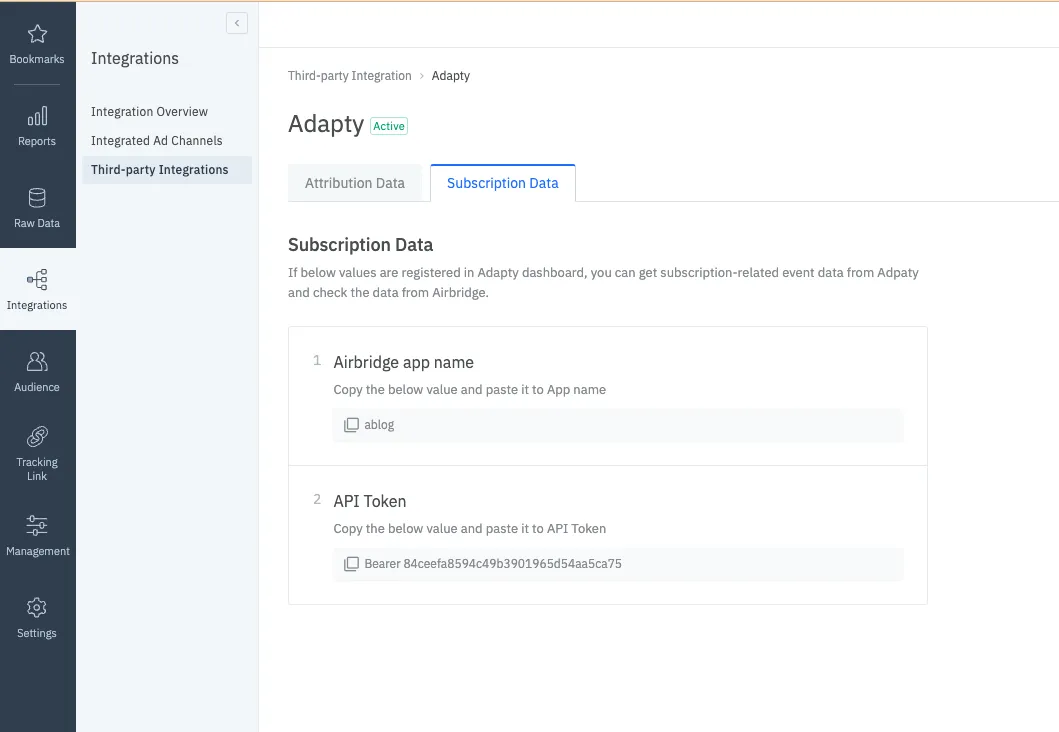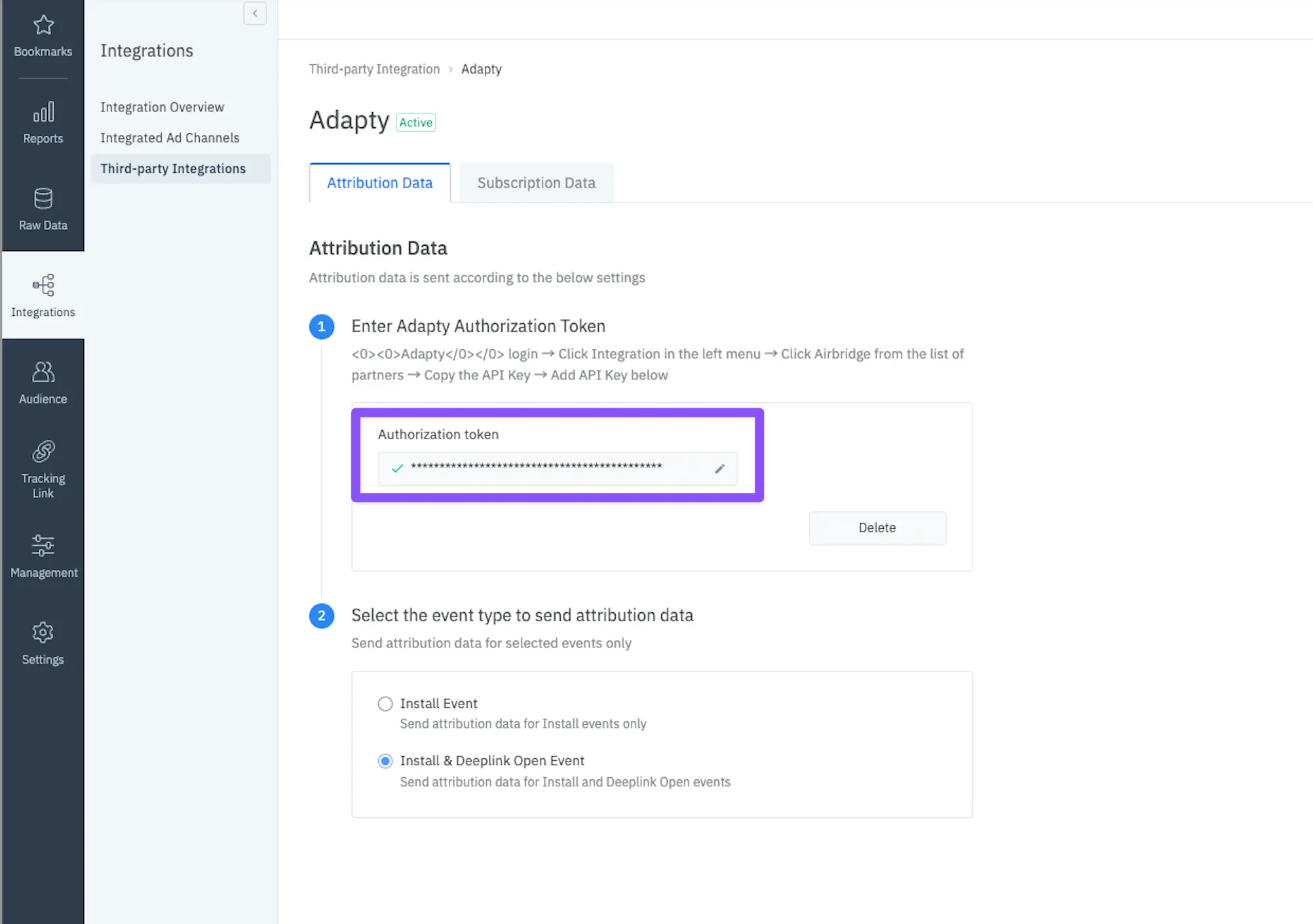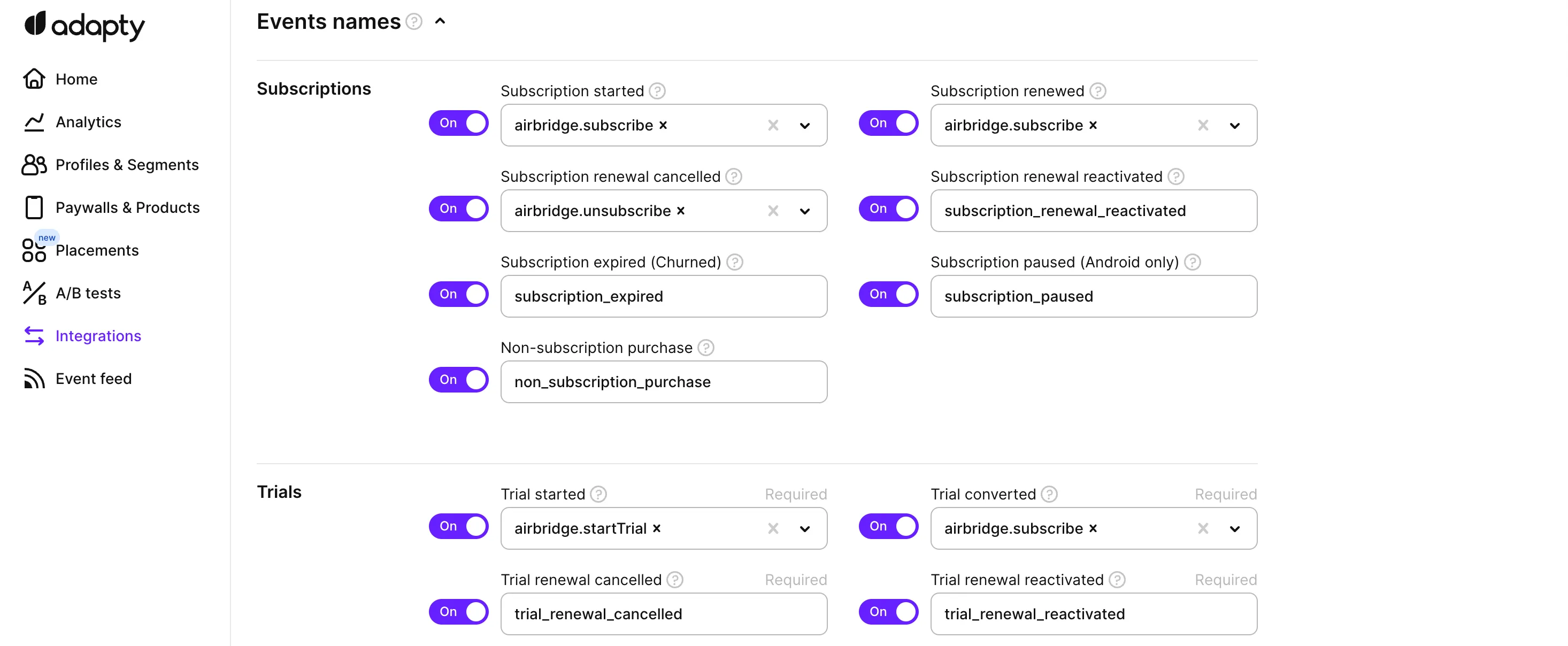Airbridge
Airbridge offers an integrated marketing performance analysis for websites and mobile apps by consolidating data collected from multiple devices, platforms, and channels. Using Airbridge’s Identity Resolution Engine, you can combine scattered customer identity data from web and app interactions into a unified people-based identity, resulting in more accurate attribution.
Adapty provides a complete set of data that lets you track subscription events from stores in one place. With Adapty, you can easily see how your subscribers are behaving, learn what they like, and use that information to communicate with them in a way that’s targeted and effective.
The integration between Adapty and Airbridge operates in two main ways.
- Receiving attribution data from Airbridge
Once you’ve set up the Airbridge integration, Adapty will start receiving attribution data from Airbridge. You can easily access and view this data on the user’s page. - Sending subscription events to Airbridge
Adapty can send all subscription events which are configured in your integration to Airbridge. As a result, you’ll be able to track these events within the Airbridge dashboard. This integration is beneficial for evaluating the effectiveness of your advertising campaigns.
Set up integration
Connect Adapty to Airbridge
To integrate Airbridge go to Integrations > Airbridge, turn on a toggle from off to on, and fill out fields.
First of all set credentials to build a connection between your Airbridge and Adapty profiles. Airbridge app name and Airbridge API token are required.

They both can be found in your Airbridge dashboard in the Third-party Integrations > Adapty section.

Adapty API token field is pre-generated on the Adapty backend. You will need to copy the value of Adapty API token and paste it into the Airbridge Dashboard in the Adapty Authorization Token field.

Configure events and tags
Below the credentials, there are three groups of events you can send to Airbridge from Adapty

Simply turn on the ones you need.
Connect your app to Airbridge
For the integration, you should pass airbridge_device_id to profile builder and call setIntegrationIdentifier as it is shown in the example below:
Read more about airbridgeDeviceId in Airbridge documentation.
It may take Adapty up to 24 hours to receive Airbridge attribution data following a subscription event. Adapty will immediately display it on the dashboard.
Event structure
Adapty sends selected events to Airbridge as configured in the Events names section on the Airbridge Integration page. Each event is structured like this:
{
"user": {
"externalUserID": "user_12345",
"externalUserEmail": "[email protected]",
"attributes": {
"is_premium": true
}
},
"device": {
"deviceUUID": "550e8400-e29b-41d4-a716-446655440000",
"deviceModel": "iPhone 14 Pro",
"osName": "iOS",
"osVersion": "17.0.1",
"locale": "en-US",
"timezone": "America/New_York",
"ifa": "00000000-0000-0000-0000-000000000000",
"ifv": "00000000-0000-0000-0000-000000000000"
},
"app": {
"packageName": "com.example.app",
"version": "1.2.3"
},
"eventUUID": "d4f6f1f4-96fb-4a31-bafd-599fef77be90",
"eventTimestamp": 1709294400000,
"eventData": {
"goal": {
"category": "airbridge.subscribe",
"customAttributes": {
"isTrialConverted": true
},
"semanticAttributes": {
"transactionID": "GPA.3383-4699-1373-07113",
"totalValue": 9.99,
"currency": "USD",
"period": "P1M",
"isRenewal": true,
"renewalCount": 2,
"products": [
{
"productID": "yearly.premium.6999",
"name": "yearly.premium.6999",
"position": 1
}
]
}
}
}
}Where:
| Parameter | Type | Description |
|---|---|---|
user | Object | User information. |
user.externalUserID | String | The user’s Customer User ID. |
user.externalUserEmail | String | The user’s email address (if available). |
user.attributes | Object | Custom user attributes. |
device | Object | Device information. |
device.deviceUUID | String | The Airbridge Device UUID. |
device.deviceModel | String | Device model (e.g., “iPhone 14 Pro”). |
device.osName | String | OS name (e.g., “iOS”, “Android”). |
device.osVersion | String | OS version. |
device.ifa | String | iOS only. ID for Advertisers. |
device.ifv | String | iOS only. ID for Vendors. |
device.gaid | String | Android only. Google Advertising ID. |
app | Object | App information. |
app.packageName | String | The application’s package name / bundle ID. |
app.version | String | The application’s version. |
eventUUID | String | Unique ID for the event in Adapty. |
eventTimestamp | Long | Timestamp of the event in milliseconds. |
eventData | Object | Event details. |
eventData.goal.category | String | The Airbridge event category (mapped from Adapty event). |
eventData.goal.semanticAttributes | Object | Standard event attributes. |
...semanticAttributes.transactionID | String | Store Transaction ID. |
...semanticAttributes.totalValue | Float | Revenue amount. |
...semanticAttributes.currency | String | Currency code (e.g., “USD”). |
...semanticAttributes.period | String | Subscription period in ISO 8601 duration format (e.g., “P1M”). |
...semanticAttributes.isRenewal | Boolean | true if this is a renewal transaction. |
...semanticAttributes.renewalCount | Integer | Number of successful renewals. |
...semanticAttributes.products | Array | List of products involved in the event. |
...semanticAttributes.products[].productID | String | The Product ID from the store (e.g., “yearly.premium.6999”). |
...semanticAttributes.products[].name | String | Same as productID. |
...semanticAttributes.products[].position | Integer | The position of the product in the list (always 1). |